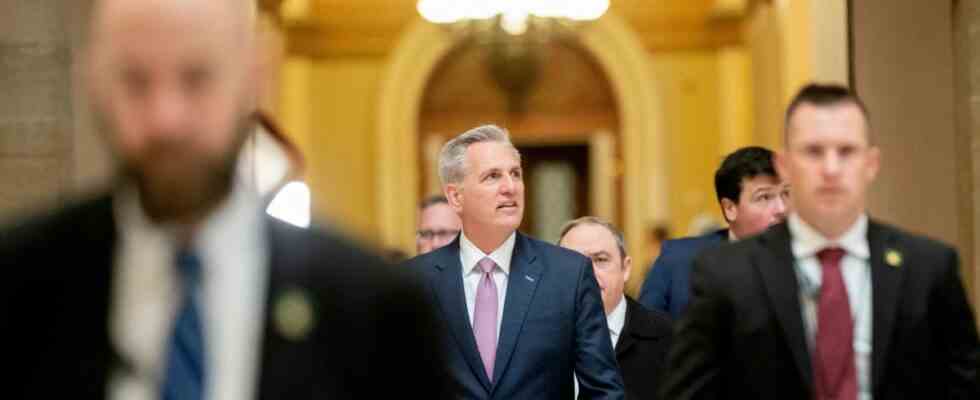Xi Jinping tends to delegate direct criticism of the US to the lower echelons. On Monday, however, China’s president specifically accused the opponent of harming his country. “Western countries, led by the US, have sealed off, encircled and oppressed China all around,” Xi told the main political advisory body in Beijing. Shortly before, Foreign Minister Qin Gang had warned on the sidelines of the National People’s Congress that the United States’ China policy would have “catastrophic consequences”.
The sharp words of the Chinese ruler were met with astonishment in the USA. Xi said he used nationalist rhetoric in Cold War terms Wall Street Journal firmly. He must have tried to distract from his country’s poor economic figures and mistakes in dealing with the Covid pandemic.
Americans, meanwhile, are no strangers to nationalist rhetoric. The outrage barometer against China is surging every week. The US Congress set up a special committee to deal with Beijing, and a US general predicted a war in 2025. Shortly thereafter, President Joe Biden had a Chinese spy balloon shot out of the sky, and three other rockets sent out “as a precaution” hit harmless amateur balloons. The US Department of Energy and the FBI have concluded that Sars-CoV-2 was probably born in a laboratory accident in China.
Trump is fuming, while Biden is stricter on China than he is
And there are politicians like former President Donald Trump making China a key campaign issue again. China must pay compensation for the Covid pandemic, Trump has just demanded in an article in the British tabloid Daily Mail. In his most recent speech, the most promising Republican presidential candidate promised to decouple the economies of the USA and China with import tariffs, investment bans and the official downgrading of China from the status of most favored trading partner. “I will tax China to build America,” Trump said.
As President, Trump only partially implemented his grandiose announcements against China. But he made punitive tariffs capable of gaining a majority, and he managed first to get the American public and then politicians on a confrontational course towards China. This scenario could repeat itself in the upcoming election campaign.
Above all, Beijing feels pressured by Washington because President Joe Biden is pursuing the dispute much more consistently than Trump himself has ever done. Biden has declared China the main competitor and aligned the national defense strategy accordingly. He has taken steps to reduce dependence on China, for example in the manufacture of semiconductor chips.
Biden always says he wants competition, not conflict. But he also prepares for a military confrontation. To this end, he has revived the alliances of the United States in the Pacific, including equipping Australia with nuclear submarines. He is also trying to break down old enmities in the region in order to enable regional alliances against China; South Korea and Japan have only just come closer together.
When McCarthy’s predecessor flew to Taiwan, Beijing responded with rockets
Biden has sharpened his rhetoric on the Taiwan issue. The official US position has long been that it would arm and support Taiwan in the event of a Chinese attack. Biden has now gone further four times by saying the US would defend Taiwan. It always remained unclear what he meant specifically, whether he was just babbling. But in Beijing, the message got through that the price of an invasion would be very high. A message that Biden is currently teaching Russia in Ukraine.
Xi’s verbal attacks come at a moment when the US is curbing its own rhetoric. Bange recently warned commentator Fareed Zakaria that Americans are at risk of falling victim to a dangerous groupthink in which the Chinese Communist Party is unanimously perceived as the greatest threat to US security. That harbors the danger of new decades of armament, permanent crises and perhaps even war.
Significantly, Republican Kevin McCarthy is now making a contribution to slowing down the spiral of escalation. The Speaker of the House of Representatives had prepared a trip to Taiwan for April. Beijing has an allergic reaction to such visits. When McCarthy’s predecessor, Democrat Nancy Pelosi, visited the country last summer, China responded with major military maneuvers off the Taiwanese coast and even fired missiles over the island.
On Monday it was made public that Kevin McCarthy decided not to visit Taiwan. Instead, he meets Taiwanese President Tsai Ing-wen in California. The Financial Times Taiwan officials said they had persuaded McCarthy to change plans. That hasn’t been officially confirmed yet, and McCarthy will certainly be wary of the impression of being a coward. At least not to China.

